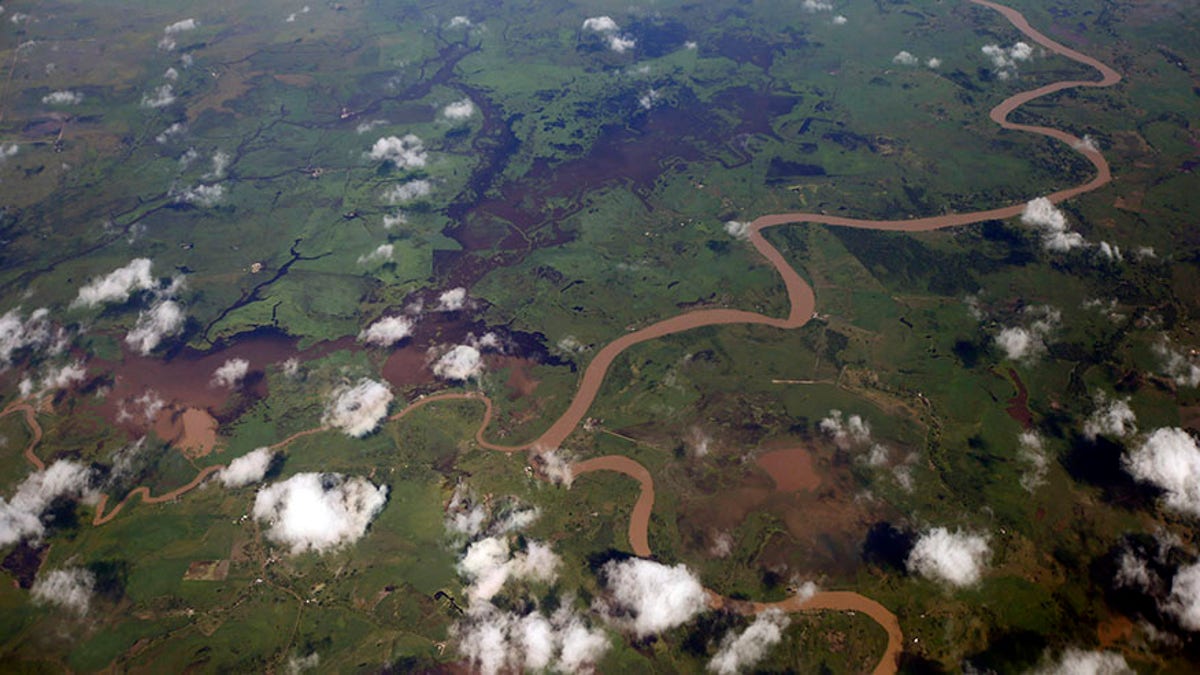
The Orinoco river winds through the jungle near Puerto Ayacucho (Reuters)
Amid record-breaking poverty rates countrywide, an increasing number of Venezuelans is stepping outside the law and trying their luck in the treacherous world of illegal mining.
The state of Bolivar, home to one of the largest gold reserves in the world, has seen in recent years a huge inflow of Venezuelans from across the country —despite the well-known fact that the area is parceled up among a number of mafia bands.
"It's like a parallel government," said one miner to the AFP, asking to remain anonymous.
VENEZUELANS KILLING FLAMINGOS AND ANTEATERS TO STAVE OFF HUNGER
Mostly devoid of any law enforcement or authority, the Orinoco Arc region is often the scene of deadly shootouts and many miners have mysteriously turned up dead.
“Each group has its territory," miner Argenis Tarazona, 47, told the news agency. "Whoever breaks the rules, whoever robs, they kill him or beat him up," he added.
Tarazona is an industrial mechanic but his salary was not enough to provide for his wife and five children. Given the extreme living conditions, he is one of thousands who left his family behind.
"I've got no other choice. I was working as a porter, but I couldn't support my three kids," said Gilberto Urrieta, 32, who arrived four months ago.
"Now I send them 150,000 bolivars a month" — approximately $53.
NEW 'ANTI-COUP SQUAD' IN VENEZUELA MONITORS, HUNTS OPPONENTS PERCEIVED AS RISK
Some of the men are bused to the mines every morning, but others sleep on site in malaria ridden camps, AFP reported.
They make somewhere between 260,000 and one million bolivars a month ($95 to $360 at the black market exchange rate), which is far higher than minimum wage.
Miner Ender Moreno, who is only 18, has been working the gold mines for years and says he plans to continue.
"I'm not afraid," he told the news agency, "I'll probably do this till I die."
"My mom says this is no kind of life, but I can't stop because I need the money to help her," he said.
"I'm young and I want to enjoy life. But when your time is up, it's up. Everyone has to die sometime."
According to the head of the Venezuelan Mining Chamber, Luis Rojas, 90 percent of the gold produced in the country comes from illegal mines.
VENEZUELA THREATENS TO EXPROPRIATE BAKERS THAT DON'T OBEY NEW BREAD REGULATIONS
Last year, the government of Nicolas Maduro announced deals with Canadian mining firm Gold Reserve and several Chinese companies authorizing open-pit mining in the Orinoco region.
The agreements were met with resistance by environmentalists and grassroots activists who say the initiative will have severe social and ecological repercussions.
“We are certain that the Orinoco Arc is an open-pit homicide against the environment,” affirmed Valentin Guimares, 26, who noted that open-pit mining uses between 450 and 1060 liters of water per gram of gold extracted.
Gold mining also uses a large amount of land and pollutes water with cyanide and mercury, harming species of wildlife such as dolphins, manatees, crocodiles and countless species of birds and fish.
“This project contradicts the eco-socialist principles of the revolution as well as the entire legal framework we have fought and shed so much blood for,” said Yarumi Gonzalez, a member of a far-left group.
“Like [late President] Chávez, we make a call to strike at the helm, to resume the revolutionary process, understanding that Chávez himself put a stop to Gold Reserve,” she said.
